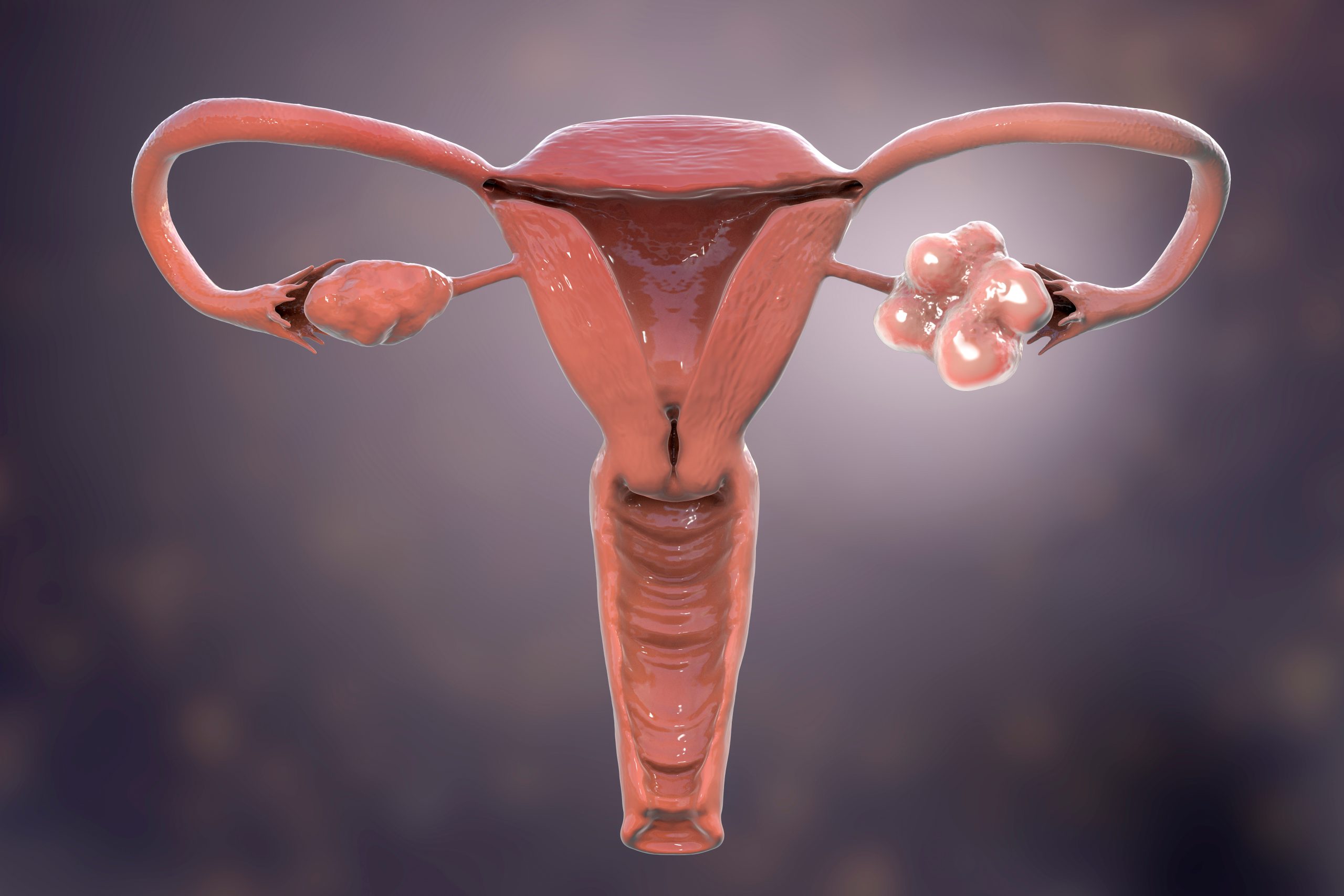PCOS – Polycystic Ovary Syndrome

Navigating PCOS: Unveiling the Challenges and Solutions of Polycystic Ovary Syndrome
Polycystic Ovary Syndrome (PCOS) is a complex and often misunderstood hormonal disorder that affects individuals worldwide, particularly women of reproductive age. PCOS can have a profound impact on various aspects of health, from fertility to metabolism. This article aims to shed light on the intricacies of PCOS, exploring its causes, symptoms, potential complications, and management strategies.
Understanding PCOS
PCOS is characterized by a combination of hormonal imbalances, irregular menstrual cycles, and the presence of small cysts on the ovaries. These cysts are actually immature follicles that haven’t developed into eggs as they should during a normal menstrual cycle.
Symptoms and Challenges
- Irregular Menstrual Cycles: Women with PCOS often experience irregular periods or even infrequent periods due to disrupted ovulation.
- Hormonal Imbalances: Elevated levels of androgens (male hormones) in women with PCOS can lead to symptoms like acne, excess facial and body hair (hirsutism), and male-pattern baldness.
- Fertility Challenges: PCOS is a leading cause of infertility. Irregular ovulation or lack of ovulation can make conception difficult.
- Insulin Resistance: Many women with PCOS have insulin resistance, which can contribute to weight gain, obesity, and an increased risk of type 2 diabetes.
Potential Complications
- Type 2 Diabetes: Insulin resistance and obesity can elevate the risk of developing type 2 diabetes.
- Heart Disease: Women with PCOS have a higher risk of cardiovascular issues due to insulin resistance, obesity, and unfavorable lipid profiles.
- Endometrial Cancer: Irregular or absent periods can lead to an overgrowth of the uterine lining, increasing the risk of endometrial cancer.
Management Strategies
- Lifestyle Changes: Weight management through a balanced diet and regular exercise can help improve insulin sensitivity and regulate hormonal imbalances.
- Medications: Depending on individual needs, medications can be prescribed to regulate menstrual cycles, manage androgens, and improve ovulation.
- Fertility Treatments: Women struggling with infertility due to PCOS can explore fertility treatments like ovulation-inducing medications and assisted reproductive technologies.
Emotional Well-Being
Dealing with the physical and emotional challenges of PCOS can be overwhelming. Support groups, counseling, and stress management techniques can be valuable tools.
PCOS is a multifaceted condition that demands careful management and understanding. By recognizing the symptoms, understanding the potential complications, and seeking appropriate medical guidance, individuals with PCOS can navigate their journey with greater empowerment. Through a combination of lifestyle changes, medications, and emotional support, those affected by PCOS can take charge of their health, work towards hormonal balance, and enhance their overall quality of life.
Decoding PCOS
Unveiling the Telltale Symptoms of Polycystic Ovary Syndrom
 Polycystic Ovary Syndrome (PCOS) is a complex hormonal disorder that affects women of reproductive age. It’s characterized by a range of symptoms that can vary widely from person to person. Recognizing these symptoms is crucial for early diagnosis and effective management. In this article, we delve into the common and often perplexing symptoms of PCOS.
Polycystic Ovary Syndrome (PCOS) is a complex hormonal disorder that affects women of reproductive age. It’s characterized by a range of symptoms that can vary widely from person to person. Recognizing these symptoms is crucial for early diagnosis and effective management. In this article, we delve into the common and often perplexing symptoms of PCOS.
The Diversity of PCOS Symptoms
PCOS manifests differently in different individuals, making it a challenging condition to identify. The hallmark of PCOS is the presence of multiple small cysts on the ovaries, but these cysts might not always cause noticeable symptoms. Instead, it’s often the hormonal imbalances associated with PCOS that give rise to telltale signs.
Irregular Menstrual Cycles
One of the most common symptoms of PCOS is irregular or absent menstrual cycles. Women with PCOS might experience fewer periods than normal, and when they do occur, they can be irregular and unpredictable. This irregularity is a result of disrupted ovulation, where the ovaries fail to release an egg regularly.
Hormonal Imbalances
- Excess Androgens: Elevated levels of androgens, commonly referred to as “male hormones,” can lead to acne, excessive facial and body hair (hirsutism), and male-pattern baldness.
- Hormonal Acne: The increase in androgens can contribute to persistent acne, particularly along the jawline and chin.
Metabolic Symptoms
- Weight Gain and Obesity: Insulin resistance, a common feature of PCOS, can lead to weight gain and obesity. These factors can worsen the hormonal imbalances.
- Acanthosis Nigricans: This is characterized by darkened, thickened patches of skin, often occurring around the neck, armpits, and groin. It’s linked to insulin resistance.
Fertility Challenges
PCOS is a leading cause of infertility. Irregular ovulation or lack of ovulation can make it difficult for women to conceive.
Emotional and Psychological Impact
The physical symptoms of PCOS can also take a toll on emotional well-being:
- Depression and Anxiety: Dealing with the physical manifestations of PCOS, such as weight gain and hirsutism, can lead to emotional distress.
- Body Image Concerns: The changes in appearance, especially due to hirsutism and acne, can impact self-esteem and body image.
Recognizing the symptoms of PCOS is the first step toward effective management and improved quality of life. Due to the diverse nature of these symptoms, early diagnosis and individualized treatment plans are essential. Seeking medical guidance and support can empower individuals to address the physical, emotional, and psychological challenges that PCOS presents, leading to a more balanced and fulfilling life.
Empowering Hormonal Harmony
The Role of a Custom Diet from a Dietitian in Managing PCOS
Polycystic Ovary Syndrome (PCOS) can be a challenging condition to manage, but a custom diet crafted by a registered dietitian (RD) can serve as a powerful tool in promoting hormonal balance and alleviating its symptoms. In this article, we explore how a personalized diet plan can be a game-changer for individuals navigating the complexities of PCOS.
Addressing Insulin Resistance
 Insulin resistance is a common feature of PCOS, contributing to weight gain, metabolic irregularities, and hormonal imbalances. A custom diet tailored by an RD can help manage insulin levels:
Insulin resistance is a common feature of PCOS, contributing to weight gain, metabolic irregularities, and hormonal imbalances. A custom diet tailored by an RD can help manage insulin levels:
- Balanced Carbohydrates: An RD designs a diet that focuses on complex carbohydrates with a low glycemic index. This prevents rapid spikes in blood sugar and insulin.
- Portion Control: Learning portion sizes and spreading meals throughout the day can help stabilize blood sugar levels and improve insulin sensitivity.
Managing Weight and Hormonal Imbalances
Weight management plays a pivotal role in PCOS management. A custom diet addresses these challenges:
- Balanced Nutrient Intake: An RD ensures an appropriate balance of macronutrients (carbohydrates, proteins, fats) and micronutrients (vitamins, minerals) to support overall health and hormonal balance.
- Focusing on Fiber: A diet rich in fiber from fruits, vegetables, whole grains, and legumes supports digestion, manages blood sugar, and aids in weight management.
Addressing Androgen-Related Symptoms
Androgens, often referred to as “male hormones,” can contribute to symptoms like hirsutism (excessive hair growth) and acne. A custom diet can help manage these symptoms:
- Anti-Inflammatory Foods: An RD incorporates foods rich in antioxidants and anti-inflammatory compounds that can help mitigate skin-related issues.
- Healthy Fats: Including sources of healthy fats, such as nuts, seeds, and avocados, supports hormonal balance and skin health.
Improving Fertility Prospects
For individuals with PCOS aiming to conceive, a custom diet can be instrumental:
- Supporting Ovulation: Balancing carbohydrates, promoting weight loss, and addressing insulin resistance can improve ovulation frequency.
- Nutrient-Dense Foods: A diet rich in essential nutrients can support reproductive health.
Providing Practical Guidance
- Mindful Eating: An RD can help foster mindful eating practices, which prevent overeating and promote a healthier relationship with food.
- Sustainable Habits: A custom diet instills sustainable dietary habits that extend beyond short-term fixes.
A custom diet from a registered dietitian isn’t just a meal plan—it’s a personalized roadmap to better hormonal health for those with PCOS. By targeting insulin resistance, managing weight, and addressing androgen-related symptoms, individuals can find relief and empowerment. Collaborating with an RD equips individuals with the knowledge, tools, and support needed to manage PCOS effectively and cultivate a balanced, healthy, and fulfilling life.
“Diets don’t work. You should never be hungry.”
Common Questions
Hiring a dietitian for PCOS management offers personalized guidance tailored to your unique needs. Dietitians possess expertise in creating custom diets that address PCOS symptoms, hormonal imbalances, and weight management, promoting better overall health.
A dietitian can design a personalized eating plan that focuses on managing insulin resistance, supporting weight loss, and improving hormonal balance. They provide guidance on balanced nutrition, portion control, and meal timing to enhance your weight management efforts.
Absolutely. A dietitian will analyze your medical history, lifestyle, and PCOS-related symptoms to create a custom diet. This may include balanced carbohydrates, fiber-rich foods, lean proteins, and healthy fats to regulate blood sugar levels, manage weight, and address specific PCOS-related concerns.
Yes, dietitians can play a vital role in supporting fertility for individuals with PCOS. They can design a diet that aids in weight management, promotes regular ovulation, and includes essential nutrients important for reproductive health, all of which contribute to improved fertility outcomes.
Dietitians approach PCOS management holistically. By addressing dietary aspects that influence hormone balance, energy levels, and mood, they contribute to enhanced overall well-being. Collaborating with a dietitian empowers you to make informed food choices that promote both PCOS symptom relief and a healthier lifestyle overall.
